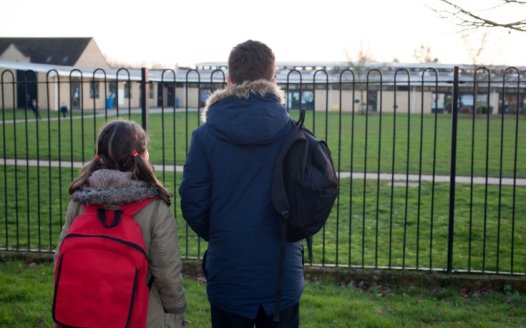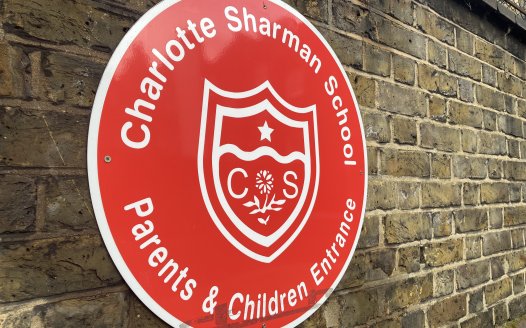Memoirs of a faith-based education
Posted: Fri, 4th Nov 2005 by Zoe Fairbairns
I had a faith-based education. The trouble was, I never knew which faith.
At home, we were Church of England. We didn't actually attend services very often, but I picked up during my pre-school years that the tall church with the green roof at the bottom of the high street, being C of E, was "our" church, in the same way that England was "our" country and the young Elizabeth II was "our" queen.
Then I started school. Here things were a bit different. It wasn't just that I was taught — in Twickenham, Middlesex — by soft-voiced Irish women in black veils who required you to address them as Sister. It wasn't even that the "Sister" was often followed by a male name – Sister Basil, Sister Albertus, Sister John. Odd though that sounded, I accepted it as normal in the way that, when you are four, everything is normal.
It seemed normal to honour the Pope, even if he did seem to think he was head of the church, when I knew for a fact that the Queen was. I had no problem about rosary beads — I thought they were rather pretty — or having them blessed by a man called Father. I envied my catholic friends their opportunities to genuflect to a piece of bread, and have dirt put on their foreheads on Ash Wednesday. I enjoyed St Patrick's Day, which was honoured with a full school assembly, shamrock and green ribbons, while St George's Day went unmarked. I gathered that this was because England had not yet been converted to the True Faith. I joined in the prayers for this to happen.
My parents, though respectful and polite when talking to the nuns, and friendly and welcoming to my catholic friends, behind their backs oscillated between amusement and indignation over the excesses of their faith. My mother disliked their presumption in calling themselves catholics – "They're Roman catholics!" she seethed. She spoke about their religion with suspicion and contempt, and — I was sorry to discover — a considerable degree of ignorance. "Catholics worship statues," she informed me, yet I knew from my compulsory religious knowledge classes that this was not true. My catholic friends and teachers saw statues as representations of someone they loved, like a photograph or souvenir, which sounded reasonable enough to me. Another of my mother's statements — "Catholics are allowed to do whatever they like, as long as they confess it afterwards" — seemed a crude oversimplification of the comforting idea that God's forgiveness is always available through the sacrament of penance.
My father, for his part, treated any form of religion as a huge joke, to be mocked at every opportunity, usually by speaking about it in an Irish accent and/or cod Latin; but at least the Church of England was there to be turned to for tasteful funerals, tuneful carol concerts and smart weddings.
The nuns who taught me — and who, contrary to popular stereotype, were neither cruel nor prudish nor bigoted, or at least no more so than anyone else — were a lot politer about non-catholic parents than mine were about them, and never actually said that the "little non-catholics" in their care were destined for hell. But they took a hard line on church attendance. "Hands up all the catholics who went to Mass on Sunday," said Sister Ligouri on Monday mornings. Up shot a forest of hands. "And now, hands up all the little non-catholics who did NOT go to church." It was our turn to raise our hands, to admit our guilt. The implications were clear. Church avoidance was a mortal sin, and mortal sin meant hell. I begged my mother to let me go to church on Sundays, instead of the compulsory family hobby of sailing, which I hated anyway. "I think Jesus would prefer you to go sailing," she replied.
Non-catholics at the school were not required to attend Mass, but we did have to take part in prayers and religious assemblies, and attend religious knowledge classes, studying catholicism as if we were catholics. I learned proofs of the existence of God, proofs that Jesus really was the son of God, and proofs that the present Pope was the direct successor of St Peter. The case for catholicism seemed watertight.
Others thought so too. When I was about 14, one of my non-catholic classmates announced that she was becoming a catholic. Another followed soon afterwards. The nuns, of course, were delighted, though no pressure was applied to the rest of us. For me all the pressure came from within. I knew in my heart that the catholic faith was the one true faith – the only question was whether I had the guts to follow that knowledge. I was afraid of the derision I would have to face at home if I took this step. I reminded myself of the courage of the early Christian martyrs; they had been fed to the lions for their faith, could I not take a little family teasing? Wouldn't that be easier to bear than burning in hell for all eternity?
In the end I decided to stay in the Church of England, but be more devout and attend services regularly. I hoped God would understand and accept this compromise. My family ridiculed my churchgoing; I prayed for them. One day at Matins, the vicar announced the beginning of confirmation classes; all those interested were to speak to him after the service. I joined the queue. Ahead of me were other teenagers, each with at least one parent. I was alone. When I reached the front, the vicar greeted me pleasantly and asked where my parents were. I explained that they were sailing. Later in the conversation he asked me what school I went to. Hearing my reply, he came as close as I had ever seen a religious person come to blowing his top: "What are your parents thinking of, sending you to a catholic school, and not even accompanying you to church?" I had no answer; clearly the vicar thought as the nuns did on this matter.
In due course I was confirmed, and started taking communion regularly at a Sung Eucharist at 9.30 on Sunday mornings. It was a beautiful service, and left me feeling reverent and sanctified.
But there was a world outside; the same spirit of rebellion that had strengthened me to join my family religion in the teeth of opposition from my family, also energised me to join the Campaign for Nuclear Disarmament. On a march in the mid-60s I met a young man who was studying philosophy at Oxford and who (in between mentholated cigarettes and French kisses during a rest-stop on Acton Green) briskly refuted my arguments for the existence of God. The incarnation and the apostolic succession were disposed of in the same way. To top things off, he lent me a copy of Bertrand Russell's Why I am Not a Christian.
I continued to go to church, but one morning I happened to attend an earlier communion service than my usual one. A much more pedestrian affair than the 9.30 Sung Eucharist, it had no music, no candles – and no sense of being transported, saved or sanctified. I sat there bored out of my skull, waiting for it to be over. A disturbing thought occurred to me: could it be that my earlier feelings of reverence, of being in a state of grace, had come simply from the music and the elaborate ceremonial? That if you took those away, you were left with nothing?
I continued to study catholic theology at school, but by now it was for me just another subject. When the time came to sit the exam, I began each of my answers with the words, "The Catholic Church teaches…", making no comment on what I myself did or did not believe. I passed. By the time I reached university I was agnostic, though not hostile to religion. That came later, with feminism and the discovery of the woman-hatred that is embedded in many of the world's major religions.
In adult life I tried to find out from my parents why they had made this peculiar educational choice for their children. (Three daughters, we all attended the same catholic school from kindergarten to sixth form.) My father was vague – "It was a good school," he said, which in many ways it was, but that didn't really answer the question; it wasn't the only "good school" in our area. My mother's reply was even more mysterious; she said, "We didn't really think about the religious aspect."
I did; and I still do, whenever I hear about non-religious parents sending their children to religious schools. The NSS rightly espouses the cause of parents who feel forced to do this; and it's not for me, as someone who has chosen not to have children and so has not faced this dilemma, to criticise them.
I just wonder what it's like for the children.
© 2005 Zoë Fairbairns







